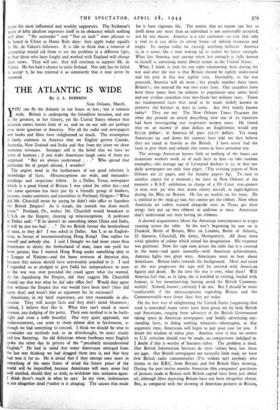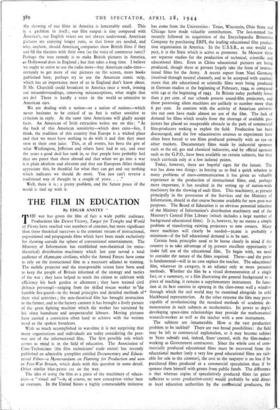THE ATLANTIC IS WIDE
By J. L. HODSON New Orleans, March.
YOU can fly the Atlantic in ten hours or less ; but it remains wide. Britain is undergoing the friendliest invasion, and one of the greatest, in her history, yet the United States whence that invasion comes knows little of us, and we on our side are perhaps even more ignorant of America. Not all the radio and newspapers and books and films have enlightened us much. The assumption is fairly common in America that we English govern Canada, Australia, New Zealand and India and that from the latter we draw immense revenues. Stranger still is the belief that we have no sense of humour ; if you make Americans laugh some of them are surprised. " But we always understood . . ." Who spread that particular bit of gospel abroad, I wonder?
The urgent need in the furtherance of our good relations is knowledge of facts. Misconceptions are wide, and misunder- standings and suspicions follow. In a Dallas, Texas, newspaper which is a good friend of Britain I was asked the other day—and the same question has been put by a friendly group of bankers, parsons, trades unionists and journalists in Portland, Oregon—" What did Mr. Churchill mean by saying he didn't take office to liquidate the British Empire? As it stands, the remark has done much harm." Portland, Or., wishes Mr. Churchill would broadcast to U.S.A. on the Empire, clearing up misconceptions. A professor at Dallas said: " If he doesn't do something about China and India, it will be just too bad. . .." Do we British favour the brotherhood of man, as they do? I was asked in Dallas. Am I, as an English- man, in favour of internationalising Hong Kong? One replies for oneself and nobody else. I said I thought we had more cause than Americans to desire the broherhood of man, since our peril has been greater, that I wanted Hong Kong under something akin to a League of Nations—and the bases overseas of America also, because this notion should have universality attached to it. I said I regarded us as pledged to give India her independence so soon as the war was over provided she could agree what she wanted. As for liquidating the Empire, did they suggest Mr. Churchill should say that was what he did take office for? Would they agree that without the Empire this war would have been lost? (they did agree that) and wasn't that an argument for its existence?
Americans, in my brief experience, are very reasonable in dis- cussion. They will accept facts and they don't mind bluntness ; indeed, I believe they like it. What they can't stand is suave evasion, any dodging of the point. Their own method is to be forth- right and even a trifle boastful. Our very quiet approach, our understatement, can seem to them almost akin to furtiveness, as though we had something to conceal. I think we should be wise to reconsider our methods and, as an afterthought, be more sturdy and less flattering. An old Anierican whose forebears were English spoke the other day in private of the "peculiarly misunderstood English." He had in mind that many Americans emerged from the last war thinking we had dragged them into it, and that they had won it for us. He is afraid that if they emerge once more in something of the same frame of mind the future peace of the world will be imperilled, because Americans will once more feel well entitled, should they so wish, to withdraw into seclusion again. I think there's much in what he says. In my view, 'isolationism is not altogether dead erather is it sleeping. The causes that made
for it have vigorous life. The notion that no nation can live to itself alone any more than an individual is not universally accepted, not by any means. America is a vast continent—so vast that only a visit to it can drive its extent home—of infinite resources and might. Its output today far exceeds anything hitherto. America is, in a sense, like a man waking up to realise his latent strength. What line America may pursue when her strength is tully known to herself is exercising many liberal minds in the United States. , What, I think, is vital for our right relationship both during the war and after the war is that Britain should be rightly understood and her part in this war rightly seen. Inevitably, as the war proceeds, America will do more ; her people number three times Britain's ; she entered the war two years later. Our casualties have been three times hers (in relation to population nine times hers) and our civilian casualties over two-thirds her military ones. Those are fundamental facts that need to be made widely known to preserve the balance in days to come. Are they widely known today? They are not. The New Orleans Times Picayune the other day printed an article describing how one of its reporters had been investigating our respective income taxes. He found that on an income of 3600 dollars an Englishman would pay 857.5o dollars : in America he pays 211.77 dollars. Yet many Americans up and down the country have told me they believe they are taxed as heavily as the British. I have never had the facts to give them and nobody else seems to have provided any.
The average American knows little or nothing of the hours our munitions workers work, or of such facts as that—to take random examples,—the average age of Liverpool dockers is 52, or that our daily newspapers are only four pages. (The evening papers of New Orleans are 22 pages, and the Sunday papers 84). To turn to another aspect for a • moment ; we have in New Orleans at the moment a R.A.F. exhibition in charge of a Flt.-Lieut. rear-gunner (a man over 3o) who shot down enemy aircraft in night-fighters during the Blitz on Britain. He has no medals on his tunic. He is entitled to the 1939-43 star, but cannot get the ribbon. Now when American air cadets trained alongside ours in Texas get their wings they put up two ribbons in addition at once. Americans don't understand our men having no ribbons.
A shrewd acquaintance likens the American consciousness to a tape running across the table. In the war's beginhing he saw on it Dunkirk, Battle of Britain, Blitz on London, Battle of Atlantic, El Alamein, Churchill, 8th Army, Montgomery. All those were vivid splashes of colour which seized his imagination. His response was generous. Now the tape runs across the table but it is covered in the main—and quite naturally—with American achievements. America fights two great wars. Americans want to hear about Americans. Britain fades towards the background. More and more as the war progresses the tape will be covered with American figures and deeds. By the time the war is over, what then? Will America feel that, as in 1919, she is justified in retiring, loaded with honour, to her mountain-top, having saved the British Common- wealth? Nobody knows ; certainly I do not. But I.should be more ..comfortable if the misconceptions regarding Britain and the Commonwealth were fewer than they are today.
On the best way of enlightening the United States (supposing that need is conceded) many views have been given me by both British and Americans, ranging from advocacy of the British Government taking space in American newspapers and boldly advertising out- standing facts, to doing nothing whatever—whereupon, so this argument runs, Americans will begin to put your case for you. I doubt the wisdom of either plan. Another view is that no retorts to U.S. criticism should ever be made, no comparisons indulged in. I doubt if this is worthy of Socrates either. The problem is hard. Our British Information Services do their valiant best, but there are gaps. Our British newspapers are naturally little read, we have -few British radio commentators (I've seldom met anybody who listens to the B.B.C. from Britain) and few British films showing. During the past twelve months American film companies' purchases of pictures made in Britain with British capital have been just about nil, although films depicting Britain have not been altogether absent. But, as compared with the showing of American pictures in Britain,
the showing of our films in America is lamentably small. This is a problem in itself ; our film output • is tiny compared with America's, our English voices are not always understood, American pictures are enjoying longer runs, so that fewer are needed, and why, anyhow, should America% companies show British films if they can fill the theatres with their own (so the voice of commerce runs)? Perhaps the true remedy is to make British pictures in America, as Hollywood does in England ; but that takes a long time. I believe we ought to strive to use the radio more—buy American radio-time- certainly to get more of our pictures on the screen, more books published here, perhaps try to use the American comic strip, which has an importance most of us in England don't know about. If Mr. Churchill could broadcast to America once a week, ironing out misunderstandings, removing misconceptions, what might that not do? There is hardly a voice in the world so attractive to American ears.
We are dealing with a nation—or a nation of nations—which never hesitates to be critical of us but is rather sensitive to criticism in reply. At the same time Americans will gladly accept facts. An American of Irish extraction writes me on this: " At the back of this American sensitivity—which does exist—lies, I think, the tradition of this country that Europe is a wicked place and that we must have nothing to do with it and that they must stew in their own juice. This, at all events, has been the gist of what Washington, Jefferson and others have had to say, and over the years a good deal has sunk in, so that people here probably feel they are purer than those abroad and that when we go into a- war it is plain idealism and altruism and that our European Allies should appreciate this, be thankful for what they can get and say nothing which indicates we should do more. You just can't reverse a traditional way of thought in a couple of years. . ." Well, there it is ; a pretty problem, and the future peace of the world is tied up with it.



























 Previous page
Previous page